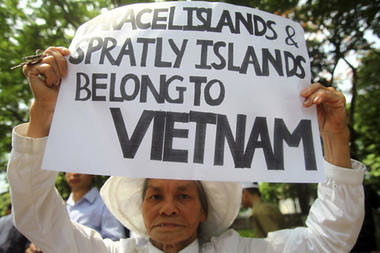
A woman holds a placard supporting Vietnam in a protest demanding China to stay out of their waters following China's increased activities around the Spratly Islands and other disputed areas, in Hanoi, Vietnam on June 12., a photo by Pan-African News Wire File Photos on Flickr.
The Christian Science Monitor - CSMonitor.com
Vietnam-China Spratly Islands dispute threatens to escalate
Tensions between China and Vietnam have risen in recent weeks, with Vietnam expressing alarm at what it says are increasingly aggressive actions by China in disputed waters
By Helen Clark, Contributor
posted June 16, 2011 at 6:57 am EDT
Hanoi, Vietnam
Tensions between Vietnam and China over disputed claims to the resource-rich Spratly Islands in the South China Sea are threatening peace in the region.
China sent its largest patrol ship Thursday on what it claimed was a routine trip through the area, but the deployment comes after a spate of other moves, including Vietnam’s staging of a live-fire exercise in the area and China’s denouncement of it.
Neither country is likely to back down easily, and if they did, neither population would see it in a favorable light. Because of this, some worry tensions could escalate to the point of exchange of fire.
“At the moment, Vietnam is trying to show that it is not going to take [challenges to its claim in the sea] lying down,” says Minxin Pei, a China expert at the Claremount McKenna College. “Rationally, China should cool it a bit. Having a fight with Hanoi is not a good idea. But if Vietnam sends back survey ships China may have no choice but to respond.”
Since the latest spat in the South China Sea, known locally as the East Sea – Vietnam accused Chinese vessels of cutting cables to their survey ships in May – China has been a hot topic among Vietnamese. Both nations’ media has been full of sabre rattling, accusations, and avowal of rights to the area.
Protests in Vietnam
The escalating tension has fueled anti-Chinese sentiment across Vietnam, with hundreds taking to the streets in rare protests in Hanoi and Ho Chi Minh City.
Last Thursday, Prime Minister Nguyen Tan Dung called Vietnamese sovereignty incontestable.
The same day, Dung also announced a new military draft clarification, apparently the first announced since the 1979 border war between Vietnam and China, which China lost. And a big show was made of announcing the “routine” live fire drills in local media.
“Vietnam’s live fire drills were something of an anticlimax ... no anti-ship missiles were test fired. And they were conducted so close to land there was no possibility of any Chinese ships being involved,” says Vietnam expert Professor Carl Thayer, at the Australian Defense Force Academy.
Complicated relationship
Although Vietnamese acknowledge that relations with China will be increasingly important – and economically beneficial – as time goes on, they find China's perceived naval bullying hard to stomach.
“They have better products and the people have better knowledge [than Vietnam]. Maybe in the future they’ll have better capacity than the United States,” says “Khon,” a student who wouldn’t give her full name, on Sunday. “Though of course, we do not agree with their actions. People cannot live in peace [if China continues its actions].”
“Not only Vietnamese people, but people worldwide think that China’s intention is for conflict in Southeast Asia,” says her friend Hoang Ton, also a student.
China has also had territorial spats recently with the Philippines – another claimant of the Spratly Islands area, along with Taiwan, Malaysia, and Brunei – and in 2009 also came into conflict with a US ship in the area.
As well as being resource-rich (an important factor for energy-hungry Vietnam and China) it is also home to important shipping lanes.
Last year, the US said maintaining stability in the area was in its “national interests,” something Beijing reacted ambivalently to, but Hanoi may welcome now.
No comments:
Post a Comment